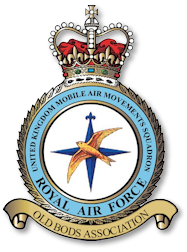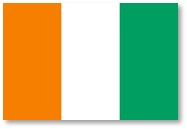

In light of the volatile and violent situation in Cote d'Ivoire in early November 2004, the UK deployed a small military team to review contingency plans, liaise with the French military authorities regarding the safety of, and offer expert advice to the British Ambassador in Abidjan. The Ministry of Defence also put in hand some precautionary preparatory work against the possible need for an evacuation operation, and placed troops on standby in the UK
On 11 November 2004, the Secretary of State for Defence made the following statement to the House of Commons:
On 11 November 2004, the Secretary of State for Defence made the following statement to the House of Commons:
"The UK places the utmost priority on protecting its citizens, whether at home or abroad. We are always prepared to deploy British forces to evacuate UK nationals should their lives be placed in jeopardy. In light of the deteriorating security situation in Cote d'Ivoire, a military reconnaissance team deployed earlier this week to assess the requirement to evacuate UK nationals. I wish to inform the House that, following this reconnaissance, the Foreign & Commonwealth Office has requested British forces to undertake an evacuation of UK nationals and others over the next few days. Some 400 people are entitled to our protection.
"While I cannot give the House precise details of the mission for reasons of operational security, we have now established liaison teams in Abidjan, and at Accra in Ghana. Concurrently, we have ordered the deployment of the Spearhead Lead Company Group, comprising Royal Gurkha Rifles personnel, to assist with this evacuation. "
The Company Group is pre-positioning in Accra and will be on immediate notice to be called forward to support the evacuation in Abidjan. It is intended to support this evacuation with a number of RAF transport aircraft. In total, this equates to a deployment of around 300 personnel.
"While I cannot give the House precise details of the mission for reasons of operational security, we have now established liaison teams in Abidjan, and at Accra in Ghana. Concurrently, we have ordered the deployment of the Spearhead Lead Company Group, comprising Royal Gurkha Rifles personnel, to assist with this evacuation. "
The Company Group is pre-positioning in Accra and will be on immediate notice to be called forward to support the evacuation in Abidjan. It is intended to support this evacuation with a number of RAF transport aircraft. In total, this equates to a deployment of around 300 personnel.
"As an additional contingency we have redirected the Landing Platform Dock HMS Albion towards Cote d'Ivoire, and reduced the notice to move for other force elements, should they be required. We would expect the operation to last days, not weeks.
"Our ability to react quickly to the situation in Cote d'Ivoire is testament to the flexibility and capability of Britain's Armed Forces, and to the professionalism of British Servicemen and women. The UK is working in close cooperation with international partners to monitor and respond to the situation in Cote d'Ivoire as it develops. In particular, we are working with the French and Ghanaians, who have offered significant enabling support to British forces."
"Our ability to react quickly to the situation in Cote d'Ivoire is testament to the flexibility and capability of Britain's Armed Forces, and to the professionalism of British Servicemen and women. The UK is working in close cooperation with international partners to monitor and respond to the situation in Cote d'Ivoire as it develops. In particular, we are working with the French and Ghanaians, who have offered significant enabling support to British forces."
The evacuation operation commenced early on 12 November, RAF Hercules aircraft flying into Cote d'Ivoire to begin ferrying UK nationals and other evacuees to Accra, where the Foreign & Commonwealth Office and Ghanaian authorities took care of their reception and onward movement. Soldiers from the Royal Gurkha Rifles provided assistance to the Consular staff on the ground in Cote d'Ivoire.
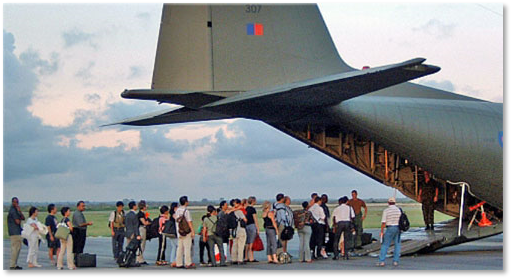
Evacuees board an RAF C-130 Hercules transport aircraft at Abidjan Airport
The evacuation by British forces was completed to the satisfaction of the British Ambassador at 1100 on 13 November, with all those UK nationals who wished to leave Cote d'Ivoire having been flown to safety in Ghana, along with the Embassy staff. In total, the three RAF Hercules aircraft brought out 220 evacuees, including some nationals of other countries at their governments' request. The British forces began returning to the UK from the operating base in Accra on 13 November, having received outstanding support and cooperation from the French and Ghanaian authorities.
Mr Gordon Wetherell, the British High Commissioner, Accra, Ghana praised both the UK military operation and the support from the Ghanaian Government: “We are very grateful for all the hard work, efficiency and co-operation of the British military deployed here and I would like to play tribute to the co-operation of the Ghanaian authorities…..they have been unstinting in their cooperation and their readiness to make facilities available to us, and without that what we have managed to do would not have been possible.”
The overall duration of the operation, from the call forward of evacuation assets from the United Kingdom to the last aircraft departing from Abidjan, was only fifty hours.
MoD
MoD
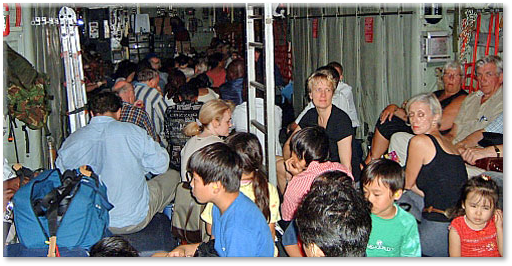
Inside the aircraft's hold, awaiting takeoff for the flight to Accra in Ghana
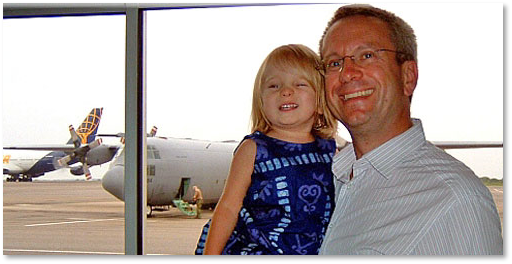
The Deputy Head of Mission at the British Embassy
in Abidjan is reunited with his daughter at Accra
in Abidjan is reunited with his daughter at Accra
